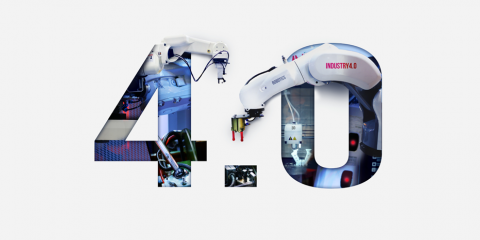The building blocks of Industry 4.0

The building blocks of Industry 4.0
Digital technologies fundamentally change the way in which companies operate. They help them to adapt to the increasing market demand for smaller series and highly personalised items and cater to the need for automation. Digitisation initiates a revolution within the manufacturing industry that will increase productivity, allow for economic growth and – ultimately – will strengthen the market competitiveness of manufacturing companies.
For smaller companies, however, it is not always obvious to identify how they can benefit from technological innovations. The potential for improving their systems or the cost-efficient implementation of these technologies may seem too far from their day-to-day reality. Still, countries with a prominent SME culture such as Belgium[1] cannot afford to miss the boat.
That’s why Sirris, Flanders Make and iMec joined forces to support SMEs in the adoption of digital technologies in view of optimising their production processes. Starting from very tangible queries, the partners set out to bridge the gap between the technological needs of these companies and the existing technological offer. This already resulted in the development of concrete, innovative solutions at the right cost.
[1] In 2016, 99.3% of all companies in Belgium were SMEs, according to FPS Economy, SME, Self-Employed and Energy (15/01/2018).
CYBER-PHYSICAL SYSTEMS
It is widely assumed that next-generation machines will most probably be cyber-physical systems. Cyber-physical systems integrate the digital and real (or physical) world. In concrete terms, a machine and its digital twin operate in parallel with one another and exchange information to improve machine performance and servitisation. This concept can also be extended to multiple machines, which all exchange information through a cloud, thus creating an Industrial Internet of Things (IIOT) that works in exactly the same way as a computer network.
The basis for initiating this digitisation, which will also promote the transition towards the 4th industrial revolution (Industry 4.0), is implementing the right infrastructure, consisting of:
- smart and reliable algorithms to transform sensor data into decisions
- reliable & fast wireless communication
- a robust control system
In this context, it will be no surprise that Flanders Make and its partners focus on these technical infrastructures as key enabling technologies for cyber-physical systems that can make companies ready for Industry 4.0. For each of these building blocks, a use case is presented.
CAMERA- AND LIDAR-BASED METHODS FOR MACHINE MONITORING: ABC’S VISION INSPECTION SYSTEM FOR FASTER PRODUCT DEVELOPMENT
Anglo Belgian Corporation (ABC) has a reputation of building robust and simple engines. They are best placed to know that the engine is the heart of any machine. For safety and cost-efficiency reasons, machine failures must be avoided. Monitoring the condition of an engine is thus paramount. However, it is not always possible to be physically present in an engine room 24/7. The same goes when ABC is testing new prototypes. If they would be able to run day and night, testing would go a lot faster.
Vision inspection is the answer. Digital imaging and image processing techniques allow for an automated, streamlined process in which the operator only intervenes when necessary. If an alarm sounds, he or she can safely shut down the engine. This may be the case when following an oil or diesel leak mist would be formed in the engine room.
ABC was thus looking for a robust and reliable vision system. Flanders Make supported ABC in exploring camera and lidar technology to ensure the best possible solution.
The algorithm that was developed instructs the system to take 15 images every second. These images are pre-processed to reduce camera noise and overexposure. Next, they are analysed against a model of the machine in normal operating conditions. This allows to identify areas with deviating behaviour. Post-processing eliminates false alarms. In this way, mist formation from leakage, for example, can be easily detected in a robust and automated way.
The programme is currently being adapted for real-time monitoring. In addition, as a vision system can detect fire much earlier than traditional systems, the combination with a fire detection system is being examined.
WIRELESS SENSING: ACCURATE LOCALISATION AND COMMUNICATION AT LVD
LVD’s sheet metal bending machines are pedal-operated. However, with the ever increasing demand for ergonomic design and production efficiency, LVD was considering going wireless. A wireless foot pedal eliminates the hassle of vulnerable cables on the floor and allows for a more lightweight design. When the sheet press machines are used in a tandem configuration, several (smaller) machines can work simultaneously, increasing the overall capacity.
However, this decision is not without challenges. First of all, the ultra-wideband wireless technology required for positioning the pedal relative to the machine must be sufficiently accurate for indoor use. Other prerequisites are low latency and a redundant design. Indeed, when one pedal can be used for several machines, you will want to make sure that the pedal cannot accidentally trigger the adjacent sheet press, potentially causing an unsafe situation.
Flanders Make researched several design options in a proof-of-concept. We selected both hardware and software and validated the set-up in a demonstration. The knowledge is now being transferred to LVD so that they are able to reproduce, operate and maintain the set-up.
Cedric Herreman, leidinggevend mechatronica-ingenieur bij LVD:
The development and validation of a wireless pedal system using UWB technology was something we could not have achieved without our collaboration with Flanders Make. We now have a proof-of-concept set-up that we can use not only for evaluation and demonstration but also for future integrations, enabling us to be top of our segment not only today but also tomorrow.
LOW-COST CONTROLLERS FOR ADVANCED CONTROL TECHNIQUES: LEARNING CONTROL LIGHTS UP THE DAY FOR ECONATION
EcoNation, a company providing daylight solutions, got in contact with Flanders Make for the optimisation of the LightCatcher, their signature light dome. The current system operates fully autonomously, receiving its power through a solar cell and battery. However, there was margin for improving the control algorithm. Changeable weather conditions created quite a few challenges because the absence of sun, irregular cloud covers and reflective objects such as windows occasionally prevented the mirror from accurately aligning with the sun.
Flanders Make developed a learning algorithm to complement the existing algorithm that controls the mirror. The algorithm is very robust and can cope with overcast situations when the true position of the sun is unknown. The mirror now remembers the path of the sun and is always in the optimal direction. This means that it rotates less in search of the sun, thus lowering power consumption and increasing efficiency. The system does not need prior calibration as it will learn its own position with respect to the sun.
Tom Denuwelaere, engineer at EcoNation:
The LightCatcher always did increase luminosity by 50%, thanks to its rotating mirror. Now, in addition to being even more effective, the robust and autonomous character of the LightCatcher considerably decreases the costs linked to installation and maintenance. This was all realised using only the current (limited) set of sensors, avoiding the potential additional costs for expensive sensors.
The upgraded light catcher is already in production and has been installed with customers. The results can also be used for other applications that involve sun tracking, think of active solar panels, active sun shaders and solar heat concentrators.
Each of the presented companies has taken crucial steps towards their digital transformation. By integrating new technologies, automating processes or improving products, they significantly increased their competitiveness. They are proof that, independently of size, manufacturing companies do have a future in Flanders and Western Europe. That is the strength of Industry 4.0.
